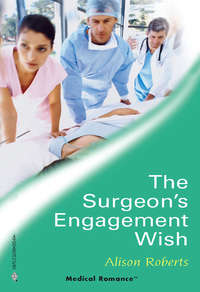
Полная версия
Doctor at Risk
‘A Harrington rod.’ Megan nodded. ‘So they’ll be looking at fitting you with a brace and mobilising you into a wheelchair pretty soon, then.’
‘I guess.’ Ross was not prepared to look forward to the prospect of a wheelchair.
‘But that’s great,’ Megan encouraged. ‘You’ll be amazed how much better you’ll feel, getting mobile.’
Maybe having company hadn’t been such a good idea after all. Ross wasn’t in the mood to be encouraged. He knew he was lucky compared to many people these nurses cared for. He knew he should be thankful for what he still had in the way of movement. And he knew that the jury was still out as far as a final outcome—but he had to come to terms with the worst prognosis. That way he could accept any improvement as a bonus, and the agony of grieving for what was lost would not be too prolonged.
Megan clearly sensed that the topic was not welcome. ‘You’re from the Coast, aren’t you? I had an uncle I used to visit over there—in Hokitika.’
‘I grew up in Hoki.’ Ross was happy to accept the change of subject. ‘But I live just outside Charleston now. I built my own house out in the bush.’
‘Really?’
‘Well, not exactly. But I had a lot of input into its design and I cleared the site. A patient of mine was a builder in Greymouth and he helped me with the building in his spare time. It took five years to complete and I feel like I built it myself.’
‘Sounds special.’ Megan rested an elbow on the side of the bed and propped her chin on her hand. ‘My fiancé and I are saving for a section at the moment. I’ve got a few ideas for a house design I’d love to try out.’
‘I tried to make mine blend in with its setting. It’s made of logs with a cedar shingle roof. I use solar panels as the main form of heating and there’s slate floors and lots of internal brickwork to soak up the heat and then release it slowly.’ Ross was unaware of the note of longing in his voice as he described his home. ‘For winter, I’ve got an open fireplace you could roast an ox in.’
‘You must be missing it,’ Megan said gently. ‘I’ll bet you can’t wait for a visit home.’
‘Not much point visiting. It’s not as though I’ll be able to live there again.’
‘Why not?’
‘It’s isolated,’ Ross said flatly. ‘And the grounds aren’t exactly manicured. I’ve put paths in to make sure I didn’t fall down any undiscovered gold-mining shafts but they wouldn’t be wheelchair-friendly. And the house is two-storeyed. The bedrooms and main bathroom are upstairs. There’s only a small shower and loo downstairs unless you count the outside bath, and that’s miles away on the edge of the bush.’
‘You’ve got a bath in the bush?’
‘Yeah.’ Ross smiled at Megan’s expression. ‘An old claw-foot, cast-iron model. It’s got a water supply from the creek and it gets heated by a gas burner. You can sit and have a soak under the stars with just a few ancient rimu trees and the occasional morepork for company.’
‘Sounds romantic.’
‘Yeah.’ Ross let his eyelids drift shut for a few seconds. It hadn’t been intended as a romantic setting but that had been before Wendy had been introduced to the property’s unusual outdoor feature. She had loved it as much as she had loved his house. She had also revelled in the exciting hint of danger from uncovered mining shafts and had been enchanted by the limestone cave in the base of the hill behind the house. It had been in that cave, sheltering from some of the rainfall that made the West Coast famous, that Ross had declared his love.
Wendy must have understood how difficult it had been to describe emotions he was experiencing for the first time in his life. She had listened, holding both his hands in her own, and she had looked more solemn than he would have believed she was capable of looking. Then she had simply nodded.
‘We’re soul mates, Ross. I love you, too. I always will.’
Megan misinterpreted the silence. ‘There’s lots of help available to get past things that can seem like big problems, you know. Even with a complete lesion around T10 people often only need a wheelchair for part of the day. Walking can be fully functional.’
‘Yeah.’ The agreement was bitter. ‘With callipers and crutches. And incomplete lesions like mine can leave people severely disabled, despite neurological recovery.’
‘Do you have any family in Hokitika?’
‘No.’ His response was curt.
The arrival of the extra staff on turning duties for the night seemed well timed. Megan was needed to do the rounds of the other patients due for a change of position and Ross was grateful that any further discussion had to be abandoned. He was in enough emotional turmoil without dredging up memories of his childhood and family. Maybe that was what was making the whole business with Wendy such agony. Nobody had ever offered him such unconditional love before. Or matched him so perfectly in his outlook on life. And now he had to take that precious gift and return it virtually unopened.
The grief of losing what he and Wendy had found together was going to be greater than losing the use of his legs, but he had no choice. His recovery, to whatever extent he could make it, was going to require total focus. It would be the biggest physical challenge Ross had ever faced. It would need all the strength he could muster and it was something he had to do alone.
Pride would not allow Ross to offer Wendy an empty shell of the man she had fallen in love with so convincingly. Their shared love of physical pursuits had brought them together and Ross could even pinpoint the moment he had known he was in love with her. Wendy had been below him on a rock-face, laughing at the sheer exhilaration of the difficulty and danger she had been faced with. He had been holding the rope, making sure that if she slipped she would still be safe. He would only hold her back now. His physical disability would be another rope—preventing her from doing what she loved to do so much. And Ross could understand better than anyone how essential doing such things could be for nurturing one’s soul.
He wouldn’t even be able to make love to her again, and the pain of losing something he’d never dreamed could be so fulfilling was unbearable. He hated Wendy touching him now because it was such an instant and searing reminder of that loss.
The timing was just so incredibly bad. If they’d already been together for years, maybe they could have faced and overcome this obstacle together. The emotional bank account of shared and equal support would have been healthy. The memories of countless nights of passion would be enough to draw on in the lean times. But it had been only weeks, not years, and their love was a fledgling that needed nurturing and time to test its wings and gather strength. It couldn’t survive the kind of stress the aftermath of this accident would present, and it would destroy Ross to watch it wither and die slowly.
The pain of that emotional destruction would remove any chance Ross had to fight and win the battle he was now facing. The temptation to draw on the strength Wendy was offering so willingly was overpowering, but the sheer force of that temptation was enough to sound an alarm he couldn’t ignore. He had wanted support like that in the past—had trusted that it would remain on offer, and he knew just how crushing it was to have it rescinded. Even if the support was unwavering, the thought that he could become a kind of emotional leech that drained even a part of the optimism and sheer joy of living from a spirit as vital as Wendy’s was simply unacceptable.
Perhaps—in a few months, or a year, or however long it took to recover—they could try again, but Ross wasn’t going to ask Wendy to wait for him. He had no right to do that when he was faced with the possibility that he might never recover. No. He had to set her completely free. He had to do it for himself as much as for her. Wendy might not understand or agree but she would thank him in the long run. And maybe...just maybe they could remain friends and Ross could keep just a little of what he’d found without feeling like a thief.
Telling her it was over would be the hardest thing he had ever faced in his life, and that was saying something. But he had to do it. And soon. Tomorrow, even, if they had any time alone together.
Yes. He would tell her tomorrow and get it over with. And then he would start coping alone.
Just as he always had.
CHAPTER TWO
‘IT’S not over.’
‘I never said it was.’
The surprised tone from her patient made Wendy blink in momentary confusion. She paused in her automatic task of cleaning around the pin piercing the skin of her patient’s forehead and anchored in the bone of his skull. The realisation that her thought had been spoken aloud was disconcerting. Wendy had been quite confident that her professionalism as a senior nurse would not be compromised by any personal problems, no matter how intensely upsetting they had the potential to be.
‘What’s not over, anyway? You’ve been fiddling with those screw things for ages.’
‘Sorry.’ Wendy dropped the cotton bud into a kidney dish. ‘I’m done now. How’s your head feeling?’
‘OK.’ Martin Gallagher’s eyes swivelled until he caught Wendy’s questioning gaze. ‘Surprisingly good, considering I must look like Frankenstein with bolts sticking out of my temples.’
‘You don’t look anything like Frankenstein.’ Wendy smiled, relieved that the subject of her audible mutter was not being pursued. The insurance of a further distraction might still be prudent, however. ‘Would you like to see? I can find a mirror.’
‘Sure. I’d better check what I look like before Gemma comes in again. Maybe she spent last night crying so much because I’m not as good-looking as I was.’
‘Be back in a tick, then.’
Wendy moved swiftly towards the storeroom to find the hand mirror. She wished she could distract herself so easily from the subject of that verbalised thought.
It wasn’t over. It couldn’t be. Not something that strong. That...right. Wendy had never believed in love at first sight but, then, she’d never seen Ross Turnball, had she? The moment their eyes had met had been unforgettable. A defining moment that she might have expected to be wildly exciting—emotional shooting stars would have done the trick—but it hadn’t been like that at all. The feeling Wendy had been aware of had been far more peaceful. Almost one of relief. She’d known she had found something she had always been searching for but had never found because she had never been able to define it adequately. The only experience Wendy could relate it to had been the moment on that Pacific cruise she had taken years ago when the tantalising outline of land had appeared on the horizon of an empty sea. It had been there, waiting to be discovered. Explored...and claimed as part of her own life.
The excitement had come a little later but had made up for the time lag by being a revelation of unimagined heights, and the knowledge of the ‘rightness’ had escalated because Ross felt exactly the same way. He hadn’t meant what he’d said last night. Of course it wasn’t over. Ross probably realised that himself by now and he might well be regretting those words. A break in her eight-hour shift in the intensive care unit would be due before too long and Wendy planned to use the time to go and see Ross in the ward. Telling him about Martin might remind him of just how serious a spinal injury could be and might serve as subtle encouragement for Ross to be thankful for how well he was doing—and how possible a full recovery still was. And how detrimental it could be to even threaten to cast aside their relationship.
Right now, however, she had to concentrate on her job. The mirror was not in its usual place on the bottom shelf. Wendy glanced up as another staff member entered the small room.
‘Have you seen the hand mirror anywhere, Pete? Martin wants to see what the tongs look like.’
Peter shook his head. ‘No. Sorry.’ He deposited a carton of IV cannulae on a stainless-steel bench. ‘I’ll keep an eye out for it, though. I’ve got to do a tidy and restock while my patient’s in Theatre.’
‘Martin might be going in after your patient. They’re going to check whether the fracture has been reduced by traction soon. It should be—he was up to nearly twenty-five kilograms at one stage.’
‘He’s a C6-7 dislocation fracture, isn’t he?’
Wendy nodded as her gaze wandered over the next shelf of supplies. ‘He dived into the shallow end of a pool to retrieve some toy his daughter dropped. He got transferred by helicopter last night with incomplete tetraplegia. He was stabilised with Gardner Wells tongs but there’s been signs of neurological deterioration since then so they’ve had to reduce the traction weight.’
‘Surgery’s likely, then. How’s he coping?’
‘Too well right now. I think he’s in denial.’ Or maybe he was just euphoric that he was still alive. As Ross had been for a brief period after his accident, until the spinal cord oedema had made his condition worse and he’d become too sick to think about anything much. By the time he had been well enough to be aware of where he was again, Ross had also been only too aware of reality. Being a doctor had been an added disadvantage, allowing him to consider the bleakest prognosis, the rarest of potential complications, and to envisage the worst-case scenarios available. Wendy gave herself a mental shake. She was supposed to be thinking about her patient.
‘His wife’s a mess. She was totally grief-stricken when she arrived last night. Apparently Paddy spent ages calming her down before he took her in to visit Martin. Ah...’ The handle of the mirror could be seen poking out from beneath some dressing packages on a higher shelf. Wendy stood on tiptoe but still couldn’t quite reach it.
‘Allow me.’ Peter was grinning. ‘It’s tough being a midget, isn’t it?’
‘I’m almost five foot one,’ Wendy informed him haughtily. ‘And I’m probably a lot fitter than you are, mate.’
‘I certainly wouldn’t try and compete with you on any athletic field.’ Peter handed her the mirror. ‘Any marathons lined up for the near future?’
‘No.’ Wendy tried not to sound despondent. ‘Ross and I were working on a training programme just before the accident to get us on track to do the Coast to Coast race next year.’
Peter’s face advertised his aversion to extreme physical challenges. ‘Whatever spins your wheels, I guess.’ His expression softened. ‘It can’t be easy for you guys at the moment. You’ve lost a lot more in common than most couples would in a situation like this.’
Wendy simply nodded. She didn’t have the heart to keep up with anything more than a minimum jogging routine right now. Not when the reminder of what Ross had probably lost was so painful.
‘I’m not surprised he’s been a bit down for the last day or two,’ Peter added. ‘It’s most likely only just sinking in now. The challenge of recovery is a rather different ball game from choosing to push a healthy body to phys ical limits.’ His smile was encouraging. ‘At least you’ll understand that more than anyone else would.’
‘I don’t think that’s helping,’ Wendy confessed. ‘Maybe I’m too much of a reminder. All the time we’ve had together has been spent doing physical things.’
Peter was grinning broadly now. ‘I’ll bet!’
‘That wasn’t what I meant.’ But Wendy’s smile faded swiftly. How long would it be before she and Ross could make love again? And would it ever be quite as wonderful?
‘Things will get better,’ Peter said gently. ‘Hang in there, Midge.’
Wendy’s fingers closed more tightly over the handle of the mirror. ‘I’m not sure about that. We didn’t part on a very happy note when I went to visit last night.’
‘Ah. That’ll be what they’re for.’
‘What are you talking about?’
‘The flowers.’
‘What flowers?’
‘I was supposed to tell you. There’s a big bunch of flowers at the nurses’ station for you. Red roses, in fact.’
‘Really?’ Wendy sounded less than excited. ‘Again? I hope there’s a card with them this time.’ She had assumed the bunch delivered last week had been from a grateful patient and the card had been lost. The teasing she had received about having a secret admirer had been easily ignored, given her concern for Ross, but it had not been particularly amusing.
‘They’ll be from Ross,’ Peter said confidently. He pulled a rubber band free from a handful of 18-gauge cannulae and added the leftover supplies to the fresh box he had opened. ‘To say sorry.’
‘Doubt it.’ A crease appeared on Wendy’s forehead. ‘I don’t think sending flowers is his style.’
‘How do you know? Has he done anything he’s needed to apologise for before?’
‘No.’
‘There you go, then. It’s classic.’
‘Hmm.’ Wendy summoned a smile as she left the storeroom. It might be classic but it didn’t fit. Ross was too much of an individual to use a hackneyed form of apology like sending flowers. Especially red roses. If he wanted to say sorry, she would have expected something like an invitation to tramp up a particularly difficult hill, had that still been possible. Now she would anticipate some carefully selected words. Just a sincere look from those expressive dark brown eyes would do the trick. However attractive it would be to confirm that Ross had not meant what he’d said, the idea of him sending red roses to do so was somehow disappointing. Wendy put off finding out and returned to her patient instead.
She positioned the mirror for Martin.
‘I can’t see the screws very well.’
‘Having curly hair hides most of it. They shaved a little patch here, see? Then they would have put local anaesthetic in before they screwed in the pins.’
‘It was the local that hurt. I remember that. And I was a bit worried they might screw them right through into my brain.’
Wendy laughed. ‘No chance. One of the screws is spring-loaded so that they know as soon as they’ve attached to the outer table of the skull. They don’t go any further than that.’
Martin was eyeing the band of metal curving over the top of his dark curls. ‘It looks like one of Olivia’s headbands when she hasn’t put it on properly.’
‘There’s an attachment at the back that I don’t think you’ll be able to see,’ Wendy told him. ‘That’s what the weights hang from.’
‘And the weight is stretching my neck so that the bones get back into alignment, right?’
‘We’re hoping so. The next X-ray should let us know whether it’s working.’
‘And what happens then?’
Wendy put the mirror down. ‘That will depend on how well you’re doing. It’s possible you might need an operation to stabilise the fracture.’
‘And if I don’t?’
‘You’ll stay here in Intensive Care for a few days.’
‘Why?’
‘We just like to keep a specially good eye on our new arrivals.’
A list of potential complications from a high spinal injury flashed through Wendy’s mind but she had no intention of frightening her patient by describing any of them. Paralytic ileus, where the small bowel ceased functioning and caused an accumulation of fluid and gas, was a common cause of death if unrecognised within the first forty-eight hours due to aspiration of vomitus. Paralysed patients were unable to cough adequately and death from respiratory arrest could be sudden.
Wendy glanced at the monitor beeping quietly and steadily beside the bed as the ECG spikes drifted across the screen.
Cardiac problems were also significant due to disruption to the vagus nerve that influenced heart rate. Something as simple as using suction or turning a patient could stimulate a vagal reaction and provoke a life-threatening slowing of the heart rate.
Respiratory problems were also high on the list of potential complications. Ross had had a bad spell with his breathing for a day or two when continued swelling of his spinal cord had led to a temporary increase in paralysis of the muscles required for breathing. Martin’s recent blood gas results, showing the level of oxygenation, had been good, however.
‘You get a lot more tests and drugs in the first few days as well. Like this infusion.’ Wendy checked the IV cannulation site in Martin’s arm for any sign of irritation and then ran a practised eye back up the line to ensure that the infusion was still running smoothly.
‘What is in there exactly?’
‘Methyl prednisolone. It’s a steroid that’s supposed to minimise any ongoing damage to the spinal cord. You only get it for twenty-four hours so it will stop by tonight.’
‘Do I get this tube out of my nose then?’
‘Probably not. You might have that for a day or two. It’s important because it helps to make sure you don’t vomit. That can be a problem when you can’t move.’
‘Where do I go when I get out of here?’
‘Into one of the wards.’ Wendy put on gloves before changing the bag attached to Martin’s indwelling urinary catheter. She made a note of output. Martin was unusually talkative for a new arrival but it was part of her job to deal with any concerns her patient had about his immediate future.
‘Will I be by myself?’
‘No. The wards have four beds in each room. Most patients find it’s much better to have some company.’
‘They’re all people with spinal injuries here, aren’t they?’
Wendy nodded. ‘Not all from accidents, though. Some diseases like cancer can cause spinal problems and some come from birth defects like spina bifida or cerebral palsy. And not all the injuries are recent. There are people here at all stages of recovery and lots of return patients who come back to have their kidney function checked or some other problem sorted out. Coronation Hospital is a specialist spinal injury and rehabilitation centre.’ She smiled at Martin. ‘It’s the best in the country.’
‘How long have you worked here?’
‘Nearly three years,’ Wendy responded. ‘Before that I worked in the intensive care unit of Christchurch Hospital and before that I spent a few years in a specialist spinal hospital in England.’
‘You don’t look old enough to have been working for that long.’
‘I’m thirty-two.’ Wendy grinned. ‘I just look younger because I’m so short.’
‘Is that why you wear your hair all spiked up like that? To make you look taller?’
Wendy laughed. ‘I hadn’t thought of that. I cut it short because I do a lot of outdoor stuff, like running and rock-climbing. Long hair’s a nuisance.’ She reached up to run her fingers through the blonde tufts. ‘And if I don’t put gel in and scrunch it up then it looks like some sort of weird lid.’
Martin smiled but his face was pinched and very pale.
‘How’s the pain level?’ Wendy reached for the button on the monitor to take a blood-pressure recording.
‘The worst bit at the moment is the back of my head. It really hurts.’
Wendy jotted down the blood-pressure measurement and moved to the head of her patient’s bed. She carefully slipped her fingers under the occipital area. It was a problem spot for pressure sores and she checked carefully for any matted hair that might be making complications more likely before she began rubbing the area gently. ‘Does this help?’
‘Yeah. Thanks.’
Wendy rubbed in silence for a minute. Martin’s eyes were closed and she hoped that he might be able to sleep for a while before any visits from family, doctors or other staff members, like representatives of the radiology or physiotherapy departments.
‘I’m thirty-two as well.’ Martin kept his eyes shut. ‘But even if I do end up in a wheelchair, it doesn’t mean my life is over, does it?’
‘Of course not.’ There was no chance Martin would escape the fate of being confined to a wheelchair. The best he could hope for would be retaining some function of his arms and hands. Ross had regained almost normal neurology in his upper limbs now. He was even getting some sensation back in his legs. Unfair luck as far as Martin went. Ross had fallen nearly five metres onto a surface jagged with broken concrete. Martin had dived into only one metre of water but his life had changed irrevocably. Wendy hoped he would be able to retain at least part of his positive attitude in the coming weeks.












